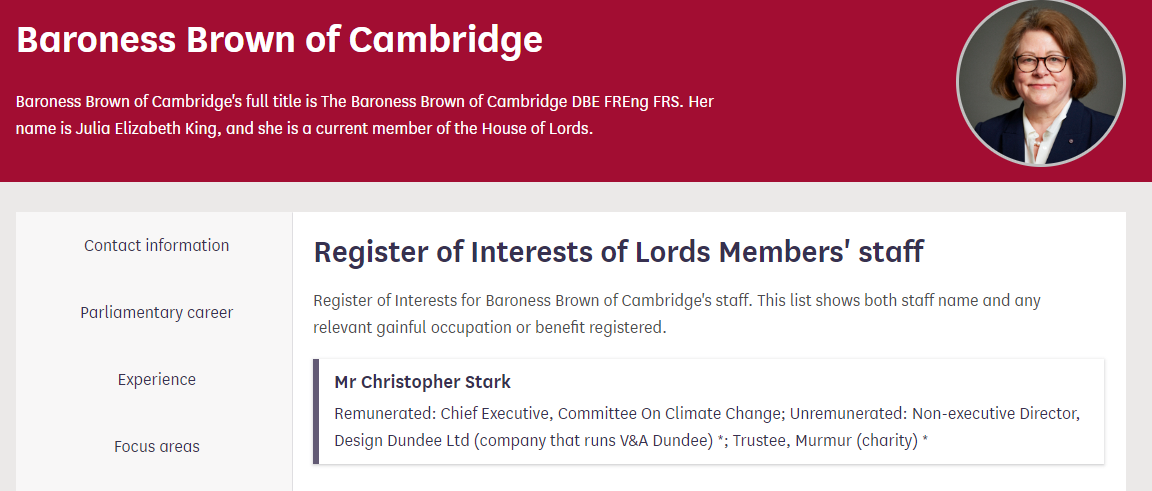Back in March, the House of Lords Science and Technology Committee produced a report on long-duration energy storage (LDES). This report urged the Government to “get on with it”. Among its key recommendations were to ask the Government to “support no-regrets investments for hydrogen”.
However, some of the members of the committee have significant conflicts of interest and incestuous relationships that call into question the objectivity of the report and the integrity of Government.
What Did the Lords LDES Report Say?
The Executive Summary of the report talks about “cheap” renewables and insists the prize for investing in storage is that the electricity system will be cheaper. We do not need to rehearse all the arguments against this statement again. It is sufficient to note that all existing renewables, whether funded by Contracts for Difference (CfDs), Renewables Obligation Certificates (ROCs) or Feed-In-Tariffs (FiTs) are currently more expensive than gas-fired electricity, as most recently discussed here.
A grid that is solely or mostly powered by renewables will therefore be more expensive than a gas-fired grid. However, as wind and solar power are intermittent in nature, they require some sort of backup or storage to ensure that the grid can always meet demand. Adding storage adds extra capital costs to the system but does not increase the amount of electricity generated. This extra expenditure must therefore increase the full system costs of electricity. So, the opening premise of their report is wrong, calling into question the rest of their analysis.
They then go on to quote extensively from the Royal Society report on long term storage (dismantled here) which farcically suggested the system cost of a renewables plus hydrogen storage grid would be ~£60/MWh. However, this cost is less than half what we pay for renewables alone today and much lower than the prices being offered in AR6. The required electrolysers, storage caverns and generators will not come cheap and will further increase the system cost of electricity. It is likely that the true costs of a renewables plus hydrogen grid will be three or four times that suggested.
How Did the Lords Get It So Wrong?
It is worrying that such an eminent committee should get things so wrong. To understand how and why they made such a glaring error, we need to look at the composition of the committee.
Baroness Brown of Cambridge chairs the Lords Science and Technology Committee. Her register of interests shows she is also the chair of the Adaptation Sub-Committee of the Committee on Climate Change (CCC). By pure coincidence, Baroness Brown is also a non-executive director of Ceres Power Holdings, which describes itself as a leading developer of “electrolysis for the creation of green hydrogen and fuel cells for power generation”. Baroness Brown’s other interests include chairing the Carbon Trust, and she is also a non-executive director of wind farm operator and developer Ørsted.
Seen in this context, it becomes easier to see why the LDES report is so enthusiastic about renewables and securing spending on hydrogen storage.
However, the web of relationships runs even wider. Professor Keith Bell acted as Specialist Advisor to the committee in the production of the LDES report. Professor Bell is also a member of the CCC having taken up the position of power sector specialist in 2019 and recently had his contract extended to April 2025.
Incestuous Links to Government
Baroness Brown also has strong links to the new Head of Mission Control at DESNZ, Chris Stark. After leaving his position as Chief Executive of the CCC, Stark was appointed as Chief Executive of the Carbon Trust, which is chaired by Baroness Brown. Mr. Stark is also listed as Baroness Brown’s staffer on the House of Lords website.

One wonders if it is appropriate for one of the most senior people responsible for decarbonising the grid by 2030 should be a staffer for a Baroness and have such a close relationship with someone with such obvious vested interests in wind power and hydrogen.
We can see that the tentacles of the green blob have extended deep into the heart of the establishment and Government. One might term this situation a two-tier system of ethics. The extensive web of commercial interests and personal relationships makes it difficult to avoid the conclusion that the recommendations of the Lords Science and Technology Committee report on long term energy storage are tainted. It is also difficult to take seriously any recommendations made by the Climate Change Committee and the new Head of Mission Control. It’s so incestuous, seriously someone should check their hands and feet for extra digits.
David Turver writes the Eigen Values Substack page, where this article first appeared.













To join in with the discussion please make a donation to The Daily Sceptic.
Profanity and abuse will be removed and may lead to a permanent ban.
Thanks; good article.
Twas ever thus, and again we are powerless to do anything. They falsely blacken the names of anyone who opposes their view, call them deniers (of what), or accuse them of being in the pay of vested interests (have you got to be one to know one?) like big oil or the Russians/Chinese.
A pox on the lot of them, except they would exploit the pox, lock us all down and try to feed us untested drugs to destroy our spirit.
Perhaps “incestuous,” is a bit harsh. Just friends helping each other out.
At our expense.
Lovely people.
“A bit harsh”?? There is nothing too harsh for the charlatans. The friends “helping each other out” are sending millions in the wealthy west into energy poverty and causing those in the third world to stay dying young of preventable diseases and back breaking labour because they are denied fossil fuels and fobbed off with phony renewables to “save the planet”.
I was of course extracting the urine. My dry, northern humour clearly doesn’t travel well.
AHH Yes——————–I have tried my dour Scots humour a few times and it hasn’t worked. People got the wrong idea and thought I was being serious and then I had to go and explain. It’s never good when you have to explain your jokes. —But actually I kind of knew you were taking the piss. I just never let a good opportunity for a rant about the climate hoax to pass.
I think the term “renewables” is deliberately misleading. Solar panels and turbine blades are not renewable or recyclable and have to be replaced. We should have energy definitions around the common denominator of “fuels”, viz:
fossil fuels
nuclear fuels
biomass fuels
imported fuels &
*weather fuels*
That’s much more honest!
They mean the fuel itself is “renewable”, but ofcourse there is nothing “honest” when it comes to anything remotely connected to climate change dogma. The whole thing is a pseudo scientific fraud with all manner of people and businesses feeding at the subsidy trough filled with taxpayers misspent money.
Intermittent (weather) and non intermittent (everything else). Non intermittent could usefully be subdivided into “easily ramped up” (e.g. gas) which is good for meeting peak demand and not easily ramped up (e.g. nuclear, possibly coal) more suitable for base load. You could also usefully subdivide between sources that are under our control (we have the fuel and the technology) and sources where we rely on other countries.
We get roughly 10% of actual generated electricity from abroad (mainly France and Norway)
To some extent it’s a question of time. The only one on the list that is not renewable is nuclear; the rest are produced by plants in the longer term. After all, they claim that “biomass” such as wood fuel for Drax is kind of renewable in the medium term, whereas so-called “fossil fuels” are longer term storage mechanisms.
Is Uranium not naturally occurring / created in the ground around the world? Highly reprocessable fuel as well. Take your general point though. Biomass through growing weed trees etc could be sustainable,
trouble is you need a lot of land
They didn’t get it wrong. The figures were changed, or to use a previously used term, sexed up to support a pre determined policy.
The system doesn’t work how it’s supposed to work or how people are made to believe it works.
We.live in a completely corrupt system.
I challenge anyone to show me otherwise.
Yet how often do we hear that anyone who questions Climate change orthodoxy or the green technologies that are supposedly going to fix all of that (whatever all of that is supposed to be) must be “in the pay of big oil”. They are “stooges for the fossil fuel companies”. The implication being that fossil fuels are the devil incarnate despite providing 85% of the worlds energy and bringing billions out of a miserable life of abject poverty, and renewables are all sweetness and light despite providing about 1% and forcing poorer people in developed countries into energy poverty and adversely affecting economies. Those champions of these niche technologies then insist that poor people living on a dollar a day in the third world should not use their fossil fuels to “fight climate change”——-Yes Green Politics is a nasty old business.
Well, here’s an example of natural long-term energy storage (NLES). A picture’s worth a thousand words.
If even a little bit of the astronomical sums spent on renewables had been put into clean coal development we would not be seeing the enormous electricity bills we currently have, crippling the economy and leaving people unable to afford energy.
It’s blatant corruption and grifting. But since the corrupt grifters are in the House of Frauds or protected by the other corrupt grifters in Government, they’re untouchable.
As ever, follow the money. It was funny when the last offshore auction attracted zero bids – say what you like about the private sector, they tend not to invest in loss making ventures if they can help it, unlike our lovely government